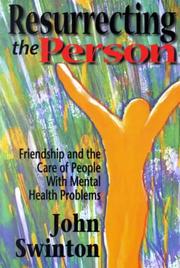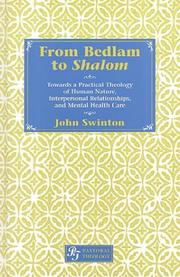| Listing 1 - 10 of 52 | << page >> |
Sort by
|

ISBN: 9780802829979 080282997X Year: 2007 Publisher: Grand Rapids: Eerdmans,
Abstract | Keywords | Export | Availability | Bookmark
 Loading...
Loading...Choose an application
- Reference Manager
- EndNote
- RefWorks (Direct export to RefWorks)
Can we defend God's love, goodness, and power in a world scarred by violence and suffering? Do we need to? Traditional attempts to explain the problem of evil have mostly seen it as a philosophical and theological task. In this fascinating take on theodicy, John Swinton reminds readers that the experience of evil and suffering precedes pontification on its origin.In "Raging with Compassion" Swinton argues for a practical theodicy, one embodied in the life and practices of the Christian community. This practicality does not seek to provide an explanation for the existence of evil, but rather presents ways in which evil and suffering can be resisted and transformed. This, he insists, will enable Christians to live faithfully with unanswered questions as they await God's redemption of the whole creation.Swinton explores essential practices of redemption -- lament, forgiveness, thoughtfulness, hospitality, and friendship -- drawing out their practical implications for the faithful resistance of evil. Enhanced by case studies from current events and by Swinton's own experience as a pastor and mental health nurse, this book seeks to inspire fresh questions about the Christian traditions, as well as new responses and modes of practice to our broken, fallen world.
Theodicy. --- Good and evil --- -Theology, Practical. --- 231.512 --- Practical theology --- Communication --- Theology --- Evil --- Wickedness --- Ethics --- Philosophy --- Polarity --- Religious thought --- Evil in motion pictures --- Evil, Problem of (Theology) --- God --- Permissive will of God --- Problem of evil (Theology) --- Religious aspects --- -Christianity --- Goed en kwaad. Lijden. God en het kwaad --- Christianity --- Permissive will --- Will, Permissive --- Theology, Practical. --- Christianity. --- 231.512 Goed en kwaad. Lijden. God en het kwaad --- Theodicy --- Theology, Practical --- Religious aspects&delete& --- Good and evil - Religious aspects - Christianity.
Book
ISSN: 23529288 ISBN: 9789004352896 9004352899 9789004352902 9004352902 Year: 2017 Volume: 4 Publisher: Leiden
Abstract | Keywords | Export | Availability | Bookmark
 Loading...
Loading...Choose an application
- Reference Manager
- EndNote
- RefWorks (Direct export to RefWorks)
This book significantly deepens the contemporary discussion of the theology and practice of adopting children. Though adoption appears prominently in Scripture, contemporary adoption practice has thus far proceeded without serious theological engagement. This book seeks to fill this gap by offering a theological and ethical perspective on adoption that not only clarifies and complicates contemporary understandings of adoption, but also throws fresh light on family, community, vocation, and even what it means to be human. Both interdisciplinary and international, the volume is brings together theologians and ethicists from Europe, the UK, Canada and the United States. A rich set of reflections from both practical and theoretical perspectives offers a unique and uniquely insightful vision of Christian adoption.
241.621 --- 241.621 Theologische ethiek: relaties binnen het gezin --- Theologische ethiek: relaties binnen het gezin --- Adoption --- Religious aspects --- Christianity. --- Religious aspects. --- Christianity --- Adoption - Religious aspects - Christianity --- Adoption - Religious aspects

ISBN: 0687082285 9780687082285 Year: 2000 Publisher: Nashville: Abingdon press,
Abstract | Keywords | Export | Availability | Bookmark
 Loading...
Loading...Choose an application
- Reference Manager
- EndNote
- RefWorks (Direct export to RefWorks)
In Resurrecting the Person, John Swinton argues that while mental illnesses are often biological and genetic in origin, the real handicap experienced by individuals is imposed by the types of reactions, values, and attitudes which are typical of contemporary western society. In other words, how a mental illness is experienced has much to do with how it is socially constructed. How will the church react to this suggestion? Swinton suggests that the key to the effective pastoral care of individuals with severe mental illness lies not only within the realms of psychiatry, therapy, and pharmacological intervention, but in the rehumanization which is borne within the relationship of friendship.
Church work with the mentally ill. --- Mental health --- Religious aspects --- Christianity. --- Church work with the mentally ill --- 253:362 --- Emotional health --- Mental hygiene --- Mental physiology and hygiene --- Happiness --- Health --- Public health --- Mental illness --- Psychiatry --- Psychology --- Psychology, Pathological --- Church work with the insane --- Mentally ill --- 253:362 Pastoraal voor gehandicapten --- Pastoraal voor gehandicapten --- Religious aspects&delete& --- Christianity --- Mental health - Religious aspects - Christianity.

ISBN: 1280551399 9786610551392 1846422205 1417549858 9781417549856 9781846422201 9781280551390 9781853028045 1853028045 1853028045 6610551391 Year: 2001 Publisher: London Philadelphia J. Kingsley Publishers
Abstract | Keywords | Export | Availability | Bookmark
 Loading...
Loading...Choose an application
- Reference Manager
- EndNote
- RefWorks (Direct export to RefWorks)
A person's sense of spirituality informs his or her awareness of self and of the society around them, and is intrinsic to their mental well-being. In this balanced and thoughtful book John Swinton explores the connections between mental health or illness and spirituality and draws on these to provide practical guidance for people working in the mental health field. He analyses a range of models of mental health care provision that will enable carers to increase their awareness of aspects of spirituality in their caring strategies.Using a critical evidence-based and interdisciplinary approach to contemporary mental health practice, Swinton explores the therapeutic significance of spirituality from the perspectives of both carers and service-users, looking at mental health problems such as psychotic disorder and depression, Alzheimer's disease and bipolar disorder. He also provides a critical review of existing literature in the field to place spirituality in contemporary theory and practice.
Mental health --- Psychotherapy --- Spirituality. --- Spiritual-mindedness --- Philosophy --- Religion --- Spiritual life --- Religious aspects. --- 253:159.9 --- 253:159.9 Pastorale psychologie --- Pastorale psychologie --- Psychotherapy - Religious aspects. --- Mental health - Religious aspects.
Book
ISBN: 9781481304085 1481304089 Year: 2016 Publisher: Waco: Baylor university press,
Abstract | Keywords | Export | Availability | Bookmark
 Loading...
Loading...Choose an application
- Reference Manager
- EndNote
- RefWorks (Direct export to RefWorks)
Time is central to all that humans do. Time structures days, provides goals, shapes dreams—and limits lives. Time appears to be tangible, real, and progressive, but, in the end, time proves illusory. Though mercurial, time can be deadly for those with disabilities. To participate fully in human society has come to mean yielding to the criterion of the clock. The absence of thinking rapidly, living punctually, and biographical narration leaves persons with disabilities vulnerable. A worldview driven by the demands the clock makes on the lives of those with dementia or profound neurological and intellectual disabilities seems pointless. And yet, Jesus comes to the world to transform time. Jesus calls us to slow down, take time, and learn to recognize the strangeness of living within God’s time. He calls us to be gentle, patient, kind; to walk slowly and timefully with those whom society desires to leave behind. In Becoming Friends of Time, John Swinton crafts a theology of time that draws us toward a perspective wherein time is a gift and a calling. Time is not a commodity nor is time to be mastered. Time is a gift of God to humans, but is also a gift given back to God by humans. Swinton wrestles with critical questions that emerge from theological reflection on time and disability: rethinking doctrine for those who can never grasp Jesus with their intellects; reimagining discipleship and vocation for those who have forgotten who Jesus is; reconsidering salvation for those who, due to neurological damage, can be one person at one time and then be someone else in an instant. In the end, Swinton invites the reader to spend time with the experiences of people with profound neurological disability, people who can change our perceptions of time, enable us to grasp the fruitful rhythms of God’s time, and help us learn to live in ways that are unimaginable within the boundaries of the time of the clock.

ISBN: 9780820444253 0820444251 Year: 2000 Publisher: New York: Lang,
Abstract | Keywords | Export | Availability | Bookmark
 Loading...
Loading...Choose an application
- Reference Manager
- EndNote
- RefWorks (Direct export to RefWorks)
This book provides a provocative and original insight into the relationship between human nature and mental health. Drawing on his experience within nursing and hospital chaplaincy, John Swinton explores some vital issues surrounding the theology and practice of mental health care. He works out a model of care-in-community that offers a timely corrective to the individualized therapeutic approaches that have come to dominate the field of mental health studies. 'From Bedlam to Shalom' argues that genuine mental health care is the work of the whole church community, carried out primarily through the forgotten relationship of friendship. By imaging the radical compassion revealed in the friendship of Jesus, the church can recover a vital communal perspective on mental health care and in so doing, move people closer to their nature as creatures made in the image of a God who is love.
Book
ISBN: 0334046726 9780334046721 Year: 2017 Publisher: Grand Rapids: Eerdmans,
Abstract | Keywords | Export | Availability | Bookmark
 Loading...
Loading...Choose an application
- Reference Manager
- EndNote
- RefWorks (Direct export to RefWorks)
Dementia is one of the most feared diseases in Western society today. Some have even gone so far as to suggest euthanasia as a solution to the perceived indignity of memory loss and the disorientation that accompanies it.In this book John Swinton develops a practical theology of dementia for caregivers, people with dementia, ministers, hospital chaplains, and medical practitioners as he explores two primary questions : Who am I when I've forgotten who I am? What does it mean to love God and be loved by God when I have forgotten who God is? Offering compassionate and carefully considered theological and pastoral responses to dementia and forgetfulness, Swinton's Dementia : Living in the Memories of God redefines dementia in light of the transformative counter story that is the gospel.
Book
ISBN: 9780334059745 0334059747 Year: 2020 Publisher: London: SCM,
Abstract | Keywords | Export | Availability | Bookmark
 Loading...
Loading...Choose an application
- Reference Manager
- EndNote
- RefWorks (Direct export to RefWorks)
Drawing from theological reflection on the lives of 30 Christians with severe mental health challenges, (depression, bipolar disorder and schizophrenia), leading disability theologian John Swinton contends that mental health problems require theological understanding and not just medical intervention. In fact, he argues, it is not necessary to care effectively for Christians experiencing severe mental illness to grasp the theological dimensions of such experiences. Therapy and pharmacology may be helpful, but on their own they are deeply inadequate. By listening carefully to the lived experiences of people with severe mental health problems, Finding Jesus in the Storm will open up new understandings and perspectives that challenge current assumptions and draws out fresh perspectives for care, healing, recovery and community. It is a book about people instead of symptoms, description instead of diagnosis, and lifegiving hope for everyone in the midst of the storm.
Book
Year: 1895 Publisher: Philadelphia : Keller Company,
Abstract | Keywords | Export | Availability | Bookmark
 Loading...
Loading...Choose an application
- Reference Manager
- EndNote
- RefWorks (Direct export to RefWorks)
Pullman Strike, 1894. --- Working class --- Industrial relations --- History. --- Pullman Strike (1894) --- 1894 --- United States
Book
Year: 1663 Publisher: [Scotland? : s.n.,
Abstract | Keywords | Export | Availability | Bookmark
 Loading...
Loading...Choose an application
- Reference Manager
- EndNote
- RefWorks (Direct export to RefWorks)
eebo-0097
| Listing 1 - 10 of 52 | << page >> |
Sort by
|

 Search
Search Feedback
Feedback About UniCat
About UniCat  Help
Help News
News